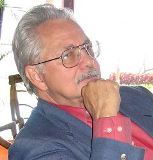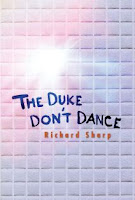Today's Interview is with Richard Sharp - Author of the Literary Fiction The Duke Don't Dance - released in April 2012 - The Duke Don't Dance is is a saga following the lives of seven protagonists of America's "silent generation" from young adulthood in the 1960s through 2011.
As a career consultant, Richard Sharp authored literally hundreds of non-fiction studies and reports over a long career and began fiction writing in 2001, producing two historical novels for mostly personal pleasure that will be released as Indie publications later this year. He wrote his current novel, "The Duke Don't Dance," in 2011 and it was published in 2012.
Interview with Author Richard Sharp
 |
| Richard Sharp |
Richard Sharp: I am now semi-retired from a long career in international development and transportation consulting in which I authored literally hundreds of reports, studies, expert testimony submissions, the history of a federal agency and the like. A little over a decade ago, I started writing fiction for my own pleasure and limited circulation, and completed two historical novels set largely in nineteenth century America that will be released this fall. In the meantime, I wrote my first semi-contemporary novel, The Duke Don’t Dance, published in February 2012 and available through Amazon in paperback and Kindle since April.
Who are your favorite writers, your favorite book, and who or what are your writing influences?
I have eclectic tastes. Examples, apart from the classic literary canon: Brecht, Wilde, Hemmingway, also Jim Morrison, Heller, Kerouac and Orwell from back in the day and Stieg Larssen, Alexandra Fuller, Dave Eggers, James Frey and Dave Barry from recently reads. However, the single greatest influence on my writing has been Isabel Allende, particularly The House of the Spirits and her memoir Paula. Her portrayal of female sensibilities inspires my own treatment of the women in my novels, balancing my male protagonists.
Tell us about your writing process. Do you have a writing routine?
I find a central theme or focal point and write around that, forward and backward: e.g., a line of graffiti for The Duke Don’t Dance. I do not start with either the beginning or the ending. The writing proceeds as I relate individual protagonists to the central concept and to each other as I commit to specific personality traits in each character. Those traits then drive the story; the inmates (protagonists) take over the asylum (novel). Along the way, I switch back and forth between new writing, editing and research. In all my writing, I try to ground my story in historical facts, from large events like the Kennedy assassination to details like where the port-a-potties were located at a 1981 Beach Boys concert.
"...marathon discipline of writing novel-length fiction..."
What do you find easiest about writing? What the hardest?
I am not a multi-tasker, so I find it difficult to focus when there are other urgent professional or personal tasks to do. That aside, I enjoy the marathon discipline of writing novel-length fiction: once you find a sustainable pace, a rhythm, the hills and valleys of developing plot and character become less of a challenge and the process moves along on its own momentum.
When did you first know that you wanted to be a writer?
Probably in the seventh grade, when I had one of those life-shaping teachers. Unfortunately, I’m one of those people who have to experience life before writing about it, so it took me a while to get started.
Richard, please tell us a little about your novel 'The Duke Don't Dance'.
As mentioned, it takes its title from graffiti I saw in a DC office building men’s room in 1980. That inspired an inconclusive discussion at the time: who was the Duke and why doesn’t he dance? I decided to use that as a metaphor for my transitional generation. The novel is all about how protagonists from this generation manage to “dance for themselves” through the post-World War II milieu: changing sexual mores, cold war conflicts, the struggle for racial equality, drug epidemic, crass commercialism, love and life in general, and growing old, all written in the spirit of the rock and roll rhythms that their contemporaries created.
 |
| Click to Read an Excerpt |
What inspired you to write the book?
Being part of the transitional generation of the novel. The Greatest Generation is named mostly for winning World War II. The Baby Boom reflects a demographic phenomenon. Those born between 1927 and 1945, give or take, came to be identified by an insult – the “Silent Generation.” A 1951 Time Magazine article griping about the younger generation created the term, later amplified by a another writer as a generation "withdrawn, cautious, unimaginative, indifferent, unadventurous and silent." BS, baby.
I never paid much attention to the pseudo-science of generational stereotyping, but the characterization was outrageous enough to test against the life experience of men and women in that age group. Drawing on a mix of personalities encountered among my cohort, my protagonists are intelligent, flawed middle class Americans encountering the massive changes in the post-war world in their distinct ways. Some things they handle well, others not so well.
The novel may clear some misconceptions. The stereotype of this age group seems based on the atmosphere of the 1950s, but the great majority of “Silents” were still in their twenties in 1960 and a few in their teens. In 1965 the median age of a Baby Boomer (born roughly 1946-1965) was only nine and the oldest nineteen! “Sex and drugs and rock and roll” was not an exclusively boomer preoccupation, not by a long shot.
Who do you see as your target audience and where can we buy the book?
The Duke Don’t Dance is written both for those of a certain age who may feel that their journey through life may have been a bit neglected or misrepresented and those younger readers who may be wondering why granny is still hooked on the Rolling Stones, or gramps still holds onto his old Vietnam War zippo inscribed “it don’t mean nuthin’.” It is definitely written for those with a sense of humor about the twists and turns of ordinary American lives over the past decades.
"Lots of great reviews..."
How would you describe the success of your book so far?
Lots of great reviews from sources I respect, embarrassing comparisons to Henry James, Joseph Heller and Evelyn Waugh, Kirkus Star, ForeWord First Finalist, Readers Favorite Finalist, sales in the low hundreds, but growing momentum. The novel is literary fiction (the alleged commercial kiss of death), so I’m delighted in the reception over the few months it has been out there.
How long did it take it to write the book?
There was the vague idea of a book fluttering around for more than twenty years. I began writing it in early 2011 and finished in under a year.
Please, tell us where you self-published the book.
Createspace.com
How smooth went the self-publishing process? Any issues? What are things to look for when self-publishing a book?
I had a good experience. The main disadvantage of self-publishing services is the practical need to insulate editors/designers from a mix of largely inexperienced writers with a great range of expectations and appreciation or mis-appreciation of their own talents. Indie authors with no track record cannot expect to have the intimate working relationship that an experienced author may have with designers and editors. The relationship with publishing service providers may sometimes seem a bit bureaucratic. That is simply the price of making publishing services so widely available.
Did you hire an editor and/or Cover Designer for your book?
Yes, through createspace.com.
"Social media and traditional PR need to be pursued..."
Can you give some tips for other Indie Authors regarding the writing and self-publishing process?
While good reviews are helpful and much worth pursuing, cruising the review blogs and writer-oriented sites is not sufficient. Social media and traditional PR need to be pursued to create awareness among your target readers. Don’t be too impressed if a Google search on your name and book title yields hundreds of hits – if potential readers don’t know your name and title, they’ll never find you that way.
Are you working on another book project? Can you tell us a little about it?
All of my writing follows protagonists over a substantial period of time. My two historical novels are to be published later this year. Jacob’s Cellar traces with the assimilation of an immigrant family into frontier America from North Carolina in pre-revolutionary days to Missouri during the Civil War. Time is the Oven is a kind of anti-Western odyssey set in the post-Civil War era inspired by the James brothers and Shakespeare’s, A Winter’s Tale. I am working on a second semi-contemporary novel set in the 1960s and 1970s entitled Crystal Ships, targeted for fall 2013. It is comes from an ancient Irish legend, a Doors song, reflecting the view that life is not about either the destination or the journey, but the vessels – the people, ideas and illusions that carry you through it.
Are you planning to move forward as an Indie author or are you looking forward to have one of your next books to be traditionally published?
I’ll consider any offers from traditional publishing houses, but am prepared to stay Indie.
Where do you see the book market in 5 or 10 years? Will there be only eBooks and will book stores disappear like record stores disappeared?
The traditional book will persist, but the traditional bookstore will be further threatened by Internet outlets of both conventional books and ebooks. However, the longer legacy of the written word compared to recorded music and its freedom from dependence on changing technological infrastructure will support survival of the bookstore to greater extent than record stores or movie rental stores.
Do you write full-time or do you have a day job?
Neither. No fixed job commitments, but interests other than writing.
How can readers connect with you?
An author web site (URL name details to be determined) should come up in about a month. In the meantime, I may be found on Amazon, Goodreads and social media sites) or via email (rgsva (at) aol.com).
Thank you so much for the Interview, Richard.
About the Book The Duke Don't Dance:
Compressed between the Greatest Generation and the Baby Boom were those who became known to some by the ill-chosen name of the Silent Generation. They were those born too late to share in the triumph of the great victory, too early to know only the privilege of the American empire and in too few numbers to assure themselves a proper identity and proper legacy.
Despite those attributes, they invented rock and roll, filled the streets in the struggle for racial equality, bled in the heated precipitates of the cold war and opened the doors to the sexual revolution and feminism, her serious-minded sister. Their triumph lay not in their completion of these transitions, but in their survival through them.
The Duke Don’t Dance follows the adult lives of men and women who made that journey.
Read more about the book here >>> Book Feature: The Duke Don't Dance
or Click here to Read an Excerpt
Links to the Author and the Book
Connect with Richard Sharp on Twitter: @Richard_G_Sharp
Link to the eBook The Duke Don't Dance on Amazon with Excerpt
Link to the Paperback The Duke Don't Dance on Amazon

No comments:
Post a Comment